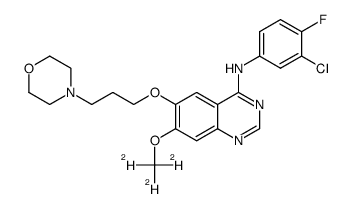1173976-40-3
| Name | N-(3-chloro-4-fluorophenyl)-7-(methoxy-d3)-6-(3-morpholinopropoxy)quinazolin-4-amine |
|---|
| Description | Gefitinib-d3 (ZD1839-d3) is the deuterium labeled Gefitinib. Gefitinib (ZD1839) is a potent, selective and orally active EGFR tyrosine kinase inhibitor with an IC50 of 33 nM. Gefitinib selectively inhibits EGF-stimulated tumor cell growth (IC50 of 54 nM) and that blocks EGF-stimulated EGFR autophosphorylation in tumor cells. Gefitinib also induces autophagy. Gefitinib has antitumour activity[1][2]. |
|---|---|
| Related Catalog | |
| In Vitro | Stable heavy isotopes of hydrogen, carbon, and other elements have been incorporated into drug molecules, largely as tracers for quantitation during the drug development process. Deuteration has gained attention because of its potential to affect the pharmacokinetic and metabolic profiles of drugs[1]. |
| References |
| Molecular Formula | C22H21ClD3FN4O3 |
|---|---|
| Molecular Weight | 449.92100 |
| Exact Mass | 449.17100 |
| PSA | 68.74000 |
| LogP | 4.28650 |
